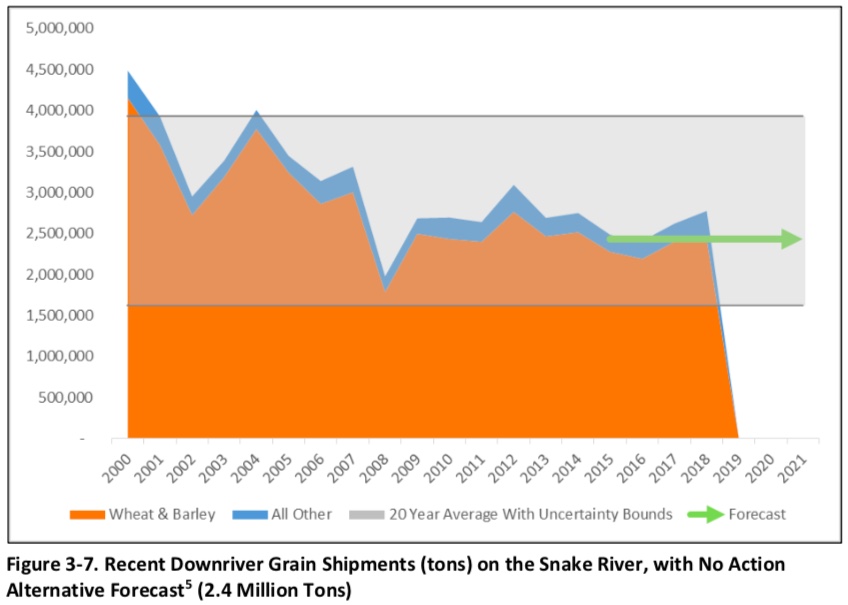forum
library
tutorial
contact

More Dam Studies are a
Waste of Time and Money
by Washington Sens. Matt Boehnke, Perry Dozier, and Nikki Torres
Moscow-Pullman Daily News, April 20, 2023
|
the film forum library tutorial contact |

|
More Dam Studies are a
by Washington Sens. Matt Boehnke, Perry Dozier, and Nikki Torres
|
Focusing on facts and results rather than anti-dam groups' rhetoric.
 Like all budgets, the new operating budget for state government is a reflection of priorities -- primarily those of the majority. As senators representing districts along or close to the Snake River, we are unable to get past one familiar Democrat priority in particular: as we write this, the budget contains yet another appropriation related to breaching the Snake River dams.
Like all budgets, the new operating budget for state government is a reflection of priorities -- primarily those of the majority. As senators representing districts along or close to the Snake River, we are unable to get past one familiar Democrat priority in particular: as we write this, the budget contains yet another appropriation related to breaching the Snake River dams.
This time it's for $2.5 million, over two years, to study how to replace the capacity to generate power and supply irrigation water that would be lost if the Democrats, who despise the dams, ever get their way.
The Army Corps of Engineers environmental impact report from 2020 rejected the idea of dam breaching based on a comprehensive assessment of both the ecological science and the power needs of the Pacific Northwest. The research concluded that there is no way to replace the clean, renewable energy the dams provide. They provide 5% of our region's electricity, enough to power the city of Seattle. Washington can only afford to lose that much power if we want to see California-style rolling blackouts.
Removing the dams could disrupt power-grid stability in the Northwest, similar to when Texas experienced widespread power outages during a 2021 cold snap.
The Snake River dams are a significant source of carbon-free power, equal to the output from two coal-fired power plants, each with a peak capacity of approximately 3 megawatts. Losing that power would dramatically increase electricity costs by approximately $1-2 billion. This would put a strain on Washington employers, consumers, and taxpayers and slow our economy in an uncertain post-pandemic period.
Breaching the dams would also impose enormous costs on agriculture from an irrigation standpoint and the transport of commodities. Hauling agriculture products by truck also means more carbon emissions than moving them via the Snake-Columbia system.
The Snake River dams have been extensively studied. We see no reason for another round of expensive studies -- $7.5 million in all, when you include the funding in the proposed transportation budget -- when there is already ample evidence of how breaching the dams would be so costly to our state. We will work until the last vote to eliminate this spending from the final budget agreement. It's time to move forward.
State officials lack any control over the future of Washington's four Snake River dams; those decisions lay in the hands of the federal government. Therefore, it's a waste of taxpayer dollars to have the state Department of Ecology study how irrigation and energy needs could be met in our region should the dams be removed.
To safeguard the four lower Snake River dams, the members of our Congressional delegation serving this part of Washington -- U.S. Reps. Dan Newhouse and Cathy McMorris Rodgers -- recently introduced the Northwest Energy Security Act. Senators Jim Risch of Idaho and Steve Daines of Montana introduced an identical bill in the Senate. Both pieces of legislation would support the Federal Columbia River Power System by improving hydropower assets, adhering to scientific reviews of operations across the system's entirety, and continuing to allow native salmon recovery at unprecedented rates.
"The four Lower Snake River Dams are vital to flood control, navigation, irrigation, agriculture, and recreation in Central Washington and throughout the Pacific Northwest; therefore, we simply can't afford to lose them," stated Rep. Newhouse. "President Biden, Governor Inslee, Senator Murray, and Representative Simpson have misinformed Americans by providing unscientific data in order to breach dams that protect our communities."
Rep. McMorris Rodgers expressed alarm about Biden's inclination towards breaching the dams, which she noted comes without scientific proof to back up his recommendations and appears to be the result of working with anti-dam activists.
She argues that her legislation is designed to preserve the dams by focusing on facts and results rather than anti-dam groups' rhetoric.
As the Congresswoman points out, salmon runs are already improving at record rates thanks to mitigation efforts and favorable ocean conditions, while dams provide clean, reliable energy to power our homes and businesses. Both are worth protecting.
Regrettably, advocates for dam breaching have often disregarded and even opposed more promising ideas that might interfere with their narrative. ...
How many studies are enough? The Democrats keep pushing for more because they never get the desired results. Instead of continuing to try to force science to conform to a politically predetermined outcome, they should be following science and innovation wherever it leads. This is the only way to ensure our communities have access to the carbon-free baseload energy we need, which only these dams provide.
Related Pages:
Columbia River System Operations EIS process' response to comments provided by bluefish.org
learn more on topics covered in the film
see the video
read the script
learn the songs
discussion forum
